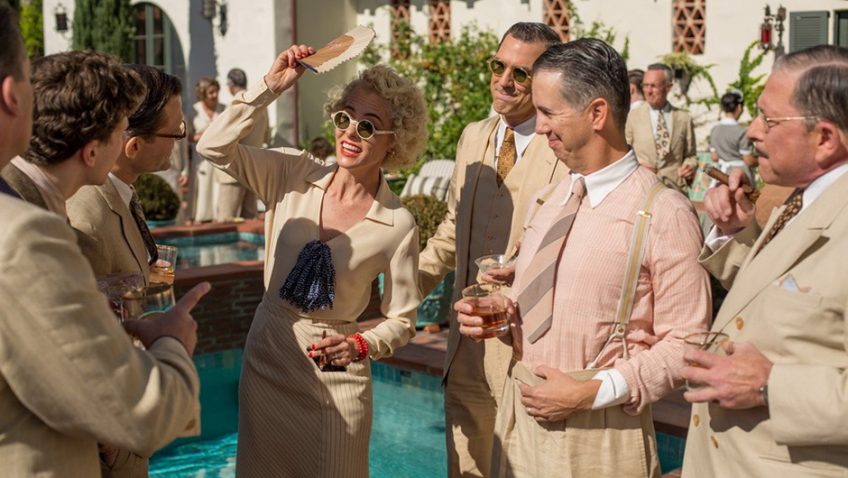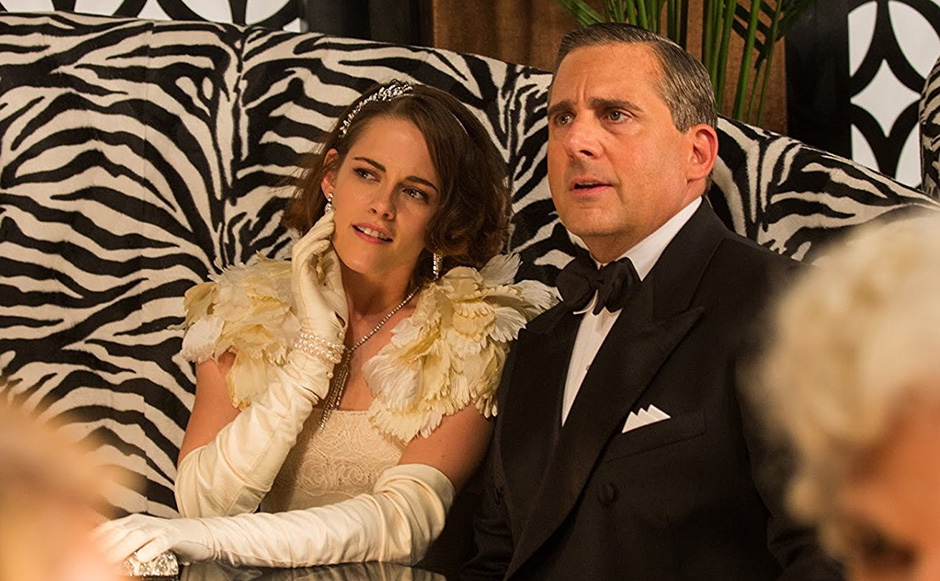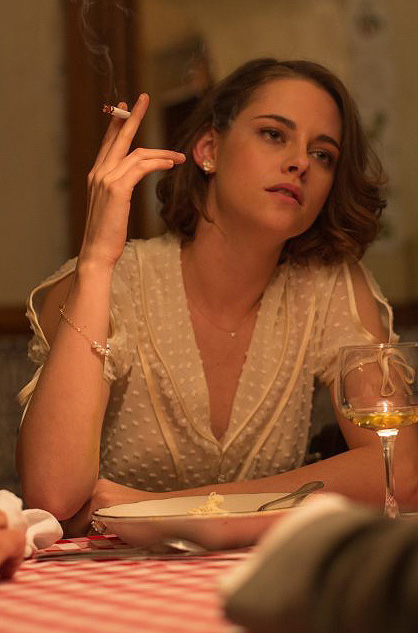Joyce Glasser reviews Café Society (September 2, 2016) Cert. 12, 96 min.
In my review of the 2009 coming-of-age movie, Adventure, I wrote: “This is a breakthrough performance and role for the talented Jesse Eisenberg (The Squid and The Whale) and it’s a wonder that Woody Allen hasn’t snapped him up already.”
Three years later Allen did cast Eisenberg in a secondary role in the forgettable ensemble comedy To Rome with Love. But first, in 2010, Eisenberg landed the great role of his career to date as Mark Zuckerberg in the Social Network. Fast forward five years.
Woody Allen, in need of a new alter-ego, and Eisenberg, in need of a leading role, serve one another well in Café Society
, a delightfully entertaining, but emotionally superficial period film about coast-to-coast beautiful people and tragic love in 1930s America.
Though 32, the baby-faced Eisenberg spends the first half of the film still very much in naive-college-grad with-nervous-charm mode, a role that he has down pat. Though it is a period piece and love story, at its core, Café Society is another coming-of-age movie but one in which Eisenberg’s character, Bobby Dorfman, already knows the lessons that his true love, Veronica (Kristen Stuart) only learns at the end of the film.
Young Dorfman takes one look at his father, Marty (Ken Stott, marvellous) and knows he is destined for something more than the family business. He leaves his borderline-dysfunctional Jewish family in the Bronx for the lure of Hollywood, where he struggles to arrange a meeting with his Uncle Phil (Steve Carell), who has made it big on the West Coast.
Phil lives in a white, modernist house and gives big pool parties where everyone is on the lookout for Ginger Rogers and Barbara Stanwyck. He is Hollywood’s most powerful talent agents at a time when the studio system ensured that talent was everything. All of this is narrated by Woody Allen.
The long awaited meeting with Phil finally arrives and, in between phone calls, Bobby manages to get a job running errands for Phil. Phil asks his secretary Veronica, nicknamed Vonnie (Kristen Stuart) to show Bobby the sights. For Bobby, it is love at first sight. For Vonnie, it’s a slower path to love, passing through companionship.
Though Vonnie works for a namedropping agent, Bobby finds it refreshing that she is unimpressed by the trappings of Hollywood stardom and prefers a Mexican dive (a ‘joint’) to the Brown Derby where her boss lunches. But a choice she is soon to make suggests otherwise. Vonnie has to decide between a struggling kind, modest man her age from the Bronx, and much older, married man who turns out to be a Hollywood kingpin.
Vonnie’s decision sends Bobby back to Manhattan where he works his way up to manager of a famous nightclub owned by his gangster brother, Ben (Corey Stoll). In a tale of two cities, he gets to know as many socialites and celebrities as Uncle Phil.
Kristen Stewart stands out in what is her finest performance since the Twilight Saga, showcasing the range of her talent. Eisenberg has a tougher time, perhaps because he has become Allen’s alter ego and we expect jokes, even when his heart is breaking. It’s nonetheless hard to believe he can manage a top Manhattan nightclub.
But Allen has made a clever casting decision in pitting Stewart opposite the taller, classier and equally beautiful Blake Lively as Veronica Hayes. There is, if not an electric natural chemistry between Stewart and Eisenberg, a chemistry based on friendship and familiarity. The pair has played girlfriend and boyfriend twice already, in Adventureland and in last year’s American Ultra, and their closeness from spending so much time together comes across on screen.
Lively, though only 29, looks older and her character dominates Bobby with her height, if not with her American blueblood. There is an amusing scene in which Lively’s Veronica confesses that ‘In Oklahoma we weren’t even allowed to mingle with Jews.’ In contrast, Uncle Ben converts to Christianity when his crimes land him on death row, because the Jewish religion ‘doesn’t have an afterlife.’
There is no shortage of jokes about Jewish culture and here Allen finds comedy in the Jewish influence in Hollywood. In one scene Bobby, deadpan, confirms the stereotype to an apprehensive Veronica Hayes, ‘we control everything.’ When Bobby learns that a call girl he meets has a Jewish name, he pays and sends her home, telling the girl, ‘I don’t want it on my conscience.’
In the United States, café society refers both to celebrities who began going out to restaurants and cabarets for their entertainment after the Prohibition Era to clubs like the 21 and the Stork Club, and to the Greenwich Village nightclub, named Café Society, opened in 1938. The first racially integrated club in the USA, with a remit to showcase black performers, this nightclub could have served as the basis of a more interesting film for a Jazz buff like Allen (the score is dominated Benny Goodman and Richard Rogers).
For one of the problems with Café Society Is that the plot is lazy and is nothing we haven’t seen before. Even the characters feel a bit too familiar with family members and Bobby’s good friends Rad (Parker Posey) and Steve (Paul Schneider) sketched in one-dimensionally but not serving a unique purpose without which the story would have been incomplete.
Allen is now 80. With the exception of Blue Jasmine, which confirmed his place as one of American cinema’s greats, he has not had a hit since 2008’s Vicky Cristina Barcelona. To make Café Society look as beautiful as possible (and it does), Allen brought in 76 year-old, triple-Academy Award-winning cinematographer old Vittorio Storaro (Apocalypse Now).
So the film looks great and the period details, costumes and sets are flawless, without being self-consciously so. What is lacking is the innovation and imagination that made Midnight in Paris (a period film not dissimilar from this) a success and the emotion that made Blue Jasmine a hit. Blue Jasmine was based on a Tennessee Williams play and we know that Williams had passion to burn. Allen has to inject some of his own Manhattan courage into his next film.
You can watch the film trailer here:







